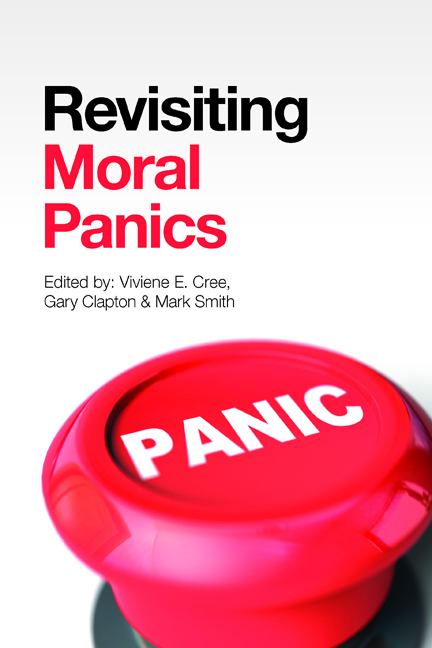Book contents
- Frontmatter
- Contents
- Contributors
- Preface
- Commentary moral panics yesterday, today and tomorrow
- Part One Gender and the family
- Part Two Moral panics in our time? Childhood and youth
- Part Three The state, government and citizens
- Part Four Moral crusades, moral regulation and morality
- Afterword the moral in moral panics
- Conclusion Moral panics and beyond
- Index
One - Women and children first. Contemporary Italian moral panics and the role of the state
Published online by Cambridge University Press: 08 March 2022
- Frontmatter
- Contents
- Contributors
- Preface
- Commentary moral panics yesterday, today and tomorrow
- Part One Gender and the family
- Part Two Moral panics in our time? Childhood and youth
- Part Three The state, government and citizens
- Part Four Moral crusades, moral regulation and morality
- Afterword the moral in moral panics
- Conclusion Moral panics and beyond
- Index
Summary
Introduction
This chapter interrogates moral panic through examination of the treatment of child abuse and femicide in Italy in recent years. The discussion builds on my own research in this field. I will argue that child abuse and intimate partner violence are social problems that have both generated moral panics in contemporary Italy. These issues are real phenomena and they must not be neglected or denied, but their severity may have been over-emphasised and over-represented within the public and media arenas, giving rise to peaks of public concern and anxiety that, in turn, have provoked reactions that can be seen as moral panics. As we will see, waves of concern about child abuse were apparent in the years 2006 to 2009; then a new kind of phenomenon emerged in 2012: ‘femicide’. This term and its menace spread through different arenas under the pressure of feminist movements, moral entrepreneurs and politicians, thus provoking widespread social alarm and calls for action.
The chapter discusses my research into the emergence of these concerns and panics, the role of moral entrepreneurs and the disproportionality of the reaction, as well as the consequent legislation and the role of the state in reinforcing the social concerns. In what follows, I first explain how we can understand these issues as moral panics and what makes them such; then I identify some of the key ingredients of these contemporary moral panics; lastly, I discuss how the state can be seen as a particular kind of definer with strong power and control over the legitimisation of social concerns. I begin, however, with a brief introduction to the methodological approach taken in my study.
The approach used in my study
The methodological approach of this study is based on a flexible form of grounded theory (Charmaz, 2006) and the use of sensitising concepts (Blumer, 1969), stemming from the seminal work of Cohen (1972), Hall et al (1978), Beck (1992), Jenkins (1992), Goode and Ben- Yehuda (1994), Beck and Beck-Gernsheim (1995), Critcher (2003 and 2009) and Hier (2011). The corpus of data is constituted by national newspaper articles (from 1992 to 2013), TV programmes (2007 for the child abuse moral panic and 2012–13 for the femicide moral panic), 60 in-depth interviews with social actors involved in the emergence of panics, ethnographies of conferences and public events about child abuse and femicide, and journalism essays about these issues.
- Type
- Chapter
- Information
- Revisiting Moral Panics , pp. 9 - 18Publisher: Bristol University PressPrint publication year: 2015

